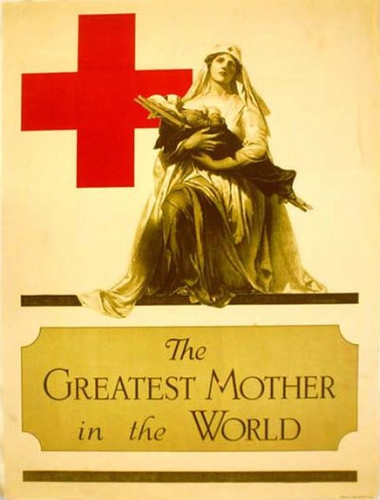Dublin Core
Title
The Greatest Mother in the World
Subject
Recruitment: Nursing
Description
"The Greatest Mother in the World" is an American propaganda poster from 1918 that encouages women to join the American Red Cross. Pictured is a woman dressed in flowy, white garb, wearing a Red Cross nurse's hat and veil. Dressed in this clothing and looking thoughtfully off into the distance, the nurse holds a wounded soldier bundled up in a stretcher. In this position, the nurse and soldier mimic the famous statue, the Pieta. With a holy reverence, the nurse cradles the soldier like Mary cradled Jesus after he was taken down from the cross.
Portraying the nurse as the Virgin Mary emphasizes the main point of this poster, that nursing is an honorable, bordering on holy, occupation. Behind the woman is the emblem of the Red Cross, and below her are the words "The Greatest Mother in the World," written in an elegant typeface on a gold plaque. The poster as a whole is very elegant and civilized, presenting nursing as a sacred profession.
This propaganda poster makes an especially strong emotional appeal to women. Motherhood itself is an emotional topic, one that causes feelings of nostalgia and sentimentality. Calling a Red Cross nurse “the greatest mother in the world” plays to a woman’s sentimental desire to nurture and care for others. Painting the nurse as a modern day portrait of the Virgin Mary intensifies the emotional appeal. Most Christian mothers desire to emulate Mary, and this poster states that the best way to accomplish this is by serving wounded soldiers as a nurse. It would be extremely convincing to women across America.
In its portrayal of the beauty of motherhood, "The Greatest Mother in the World" extends an emotional appeal to women who have a desire to directly help in the war effort while not entirely quitting their traditional female role. The nurse is a loving mother, full of the values and morals prized by tradition. At the same time, this poster presents a view of a woman outside of the home. In this poster traditional and modern ideas of womanhood meet and mesh together.
Overall, "The Greatest Mother in the World" communicates to women that nursing is an admirable, sacred occupation that will allow them to play a holy part in the War without relinquishing their traditional role of motherhood.
Portraying the nurse as the Virgin Mary emphasizes the main point of this poster, that nursing is an honorable, bordering on holy, occupation. Behind the woman is the emblem of the Red Cross, and below her are the words "The Greatest Mother in the World," written in an elegant typeface on a gold plaque. The poster as a whole is very elegant and civilized, presenting nursing as a sacred profession.
This propaganda poster makes an especially strong emotional appeal to women. Motherhood itself is an emotional topic, one that causes feelings of nostalgia and sentimentality. Calling a Red Cross nurse “the greatest mother in the world” plays to a woman’s sentimental desire to nurture and care for others. Painting the nurse as a modern day portrait of the Virgin Mary intensifies the emotional appeal. Most Christian mothers desire to emulate Mary, and this poster states that the best way to accomplish this is by serving wounded soldiers as a nurse. It would be extremely convincing to women across America.
In its portrayal of the beauty of motherhood, "The Greatest Mother in the World" extends an emotional appeal to women who have a desire to directly help in the war effort while not entirely quitting their traditional female role. The nurse is a loving mother, full of the values and morals prized by tradition. At the same time, this poster presents a view of a woman outside of the home. In this poster traditional and modern ideas of womanhood meet and mesh together.
Overall, "The Greatest Mother in the World" communicates to women that nursing is an admirable, sacred occupation that will allow them to play a holy part in the War without relinquishing their traditional role of motherhood.
Creator
Alonzo E. Foringer
Source
McFarlin Library, Department of Special Collections and University Archives, University of Tulsa. 2933 E. 6th St. Tulsa, Oklahoma 74104-3123
Publisher
Form N.Y. 31 Second War Fund
Date
1918
Language
English
Identifier
1992.004.5.65-66
Coverage
<kml xmlns="http://earth.google.com/kml/2.0"><Folder><name>OpenLayers export</name><description>Exported on Tue Feb 5 11:40:21 CST 2013</description></Folder></kml>||||osm
United States of America
United States of America
Still Image Item Type Metadata
Original Format
Poster
Physical Dimensions
69.8 x 51.9 cm
